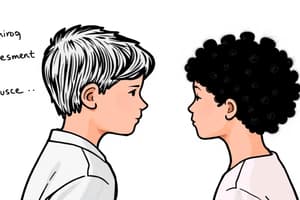Podcast
Questions and Answers
Adolescence is the phase of life between childhood and _.
Adolescence is the phase of life between childhood and _.
adulthood
What are the age brackets for early, middle, and late adolescence?
What are the age brackets for early, middle, and late adolescence?
- Early: 10-12, Middle: 12-14, Late: 18-20
- Early: 8-10, Middle: 10-15, Late: 16-18
- Early: 13-15, Middle: 15-17, Late: 17-19
- Early: 10-13, Middle: 14-16, Late: 17-20 (correct)
Who proposed the eight stages of personality development?
Who proposed the eight stages of personality development?
Erik Erikson
Adolescence is a fixed stage of development.
Adolescence is a fixed stage of development.
What is a potential result of unresolved crisis in Erikson's stages?
What is a potential result of unresolved crisis in Erikson's stages?
In early childhood, the crisis is between autonomy vs. _.
In early childhood, the crisis is between autonomy vs. _.
Match the following stages of personality development with their associated conflicts:
Match the following stages of personality development with their associated conflicts:
Flashcards are hidden until you start studying
Study Notes
Developmental Stages in Adolescence
- Adolescence is defined as the life stage between childhood and adulthood, typically ranging from ages 10 to 19.
- Characterized by significant physical, cognitive, and psychosocial growth.
- Developmental ages can be categorized into:
- Early Adolescence: approximately 10 to 13 years
- Middle Adolescence: 14 to 16 years
- Late Adolescence: 17 to 20 years
- American psychologists may define early adolescence starting at age 11 or 12 and late adolescence at age 18, marking the transition to young adulthood.
Variability in Maturity
- Maturation varies among individuals due to factors such as genetics, environment, and economic conditions.
- Not all individuals mature at the same pace; some may experience delayed or accelerated development.
Erikson's Stages of Personality Development
- Erik Erikson outlined eight stages of personality development, each associated with a specific crisis or conflict.
- Successful resolution of these crises leads to favorable outcomes, while failure can result in negative developments.
- Stages flow into one another, meaning unresolved conflicts can impact subsequent developmental stages.
Key Stages and Conflicts
- Each of Erikson's stages features:
- An influential factor (e.g., parents, teachers)
- A crisis to resolve (e.g., trust vs. mistrust)
- Possible results of resolving the crisis (favorable vs. unfavorable).
Resolution Examples
- Infancy (0-18 months): Trust vs. Mistrust
- Favorable: Trust in others
- Unfavorable: Mistrust, withdrawal
- Early Childhood (18 months - 3 years): Autonomy vs. Shame/Doubt
- Favorable: Independence and self-control
- Unfavorable: Shame and doubt leading to feelings of incompetence.
Objectives of Study
- Classify developmental tasks by stage.
- Evaluate personal development against peers.
- List methods for becoming a responsible adolescent prepared for adulthood.
Studying That Suits You
Use AI to generate personalized quizzes and flashcards to suit your learning preferences.




